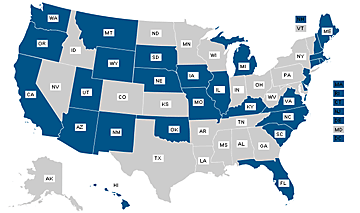 This blog post by ACLU staffer Allie Boehm was originally posted on the national ACLU's Blog of Rights.
This blog post by ACLU staffer Allie Boehm was originally posted on the national ACLU's Blog of Rights. On August 3, 34 ACLU affiliates filed 379 public records requests in 31 states around the nation, including in Wisconsin, to seek information about how our local law enforcement agencies are using our cell phone location information to track us.
Chances are you’re walking around with a tracking device in your purse or pocket – a cell phone. Location data from your cell phone can make it easy to get directions or locate the nearest coffee shop, leaving no doubt that your cell phone knows where you are. Even if you use a dumb phone, cell phones constantly send out signals searching for the nearest cell tower in order to make sure your calls actually go through – and companies can estimate your location based on your proximity to nearby towers with ever-improving accuracy. The amount of time they store this information, and in how much detail, depends on the cell phone provider. (Remember the public outrage over Apple’s surreptitious storage of iPhone and iPad user’s location information a few months ago?)
 |
| Check out our interactive map to see what agencies we've requested records from in YOUR state! |
What’s revealed by this perpetual tracking can be intensely personal; as a court recently found, one’s location might reveal “whether he is a weekly church goer, a heavy drinker, a regular at the gym, an unfaithful husband, an outpatient receiving medical treatment, an associate of particular individuals or political groups — and not just one such fact about a person, but all such facts.”Okay, I hear you thinking, “Right, but I’m not a criminal. Why should I care?” Think again. Law enforcement’s use of cell phone location data has been widespread for years. In fact, just last week, Sen. Ron Wyden (D-Ore.) asked Matthew Olsen, current general counsel for the National Security Agency and President Obama’s nominee to head the National Counterterrorism Center, whether the government can use cell phone location data to track Americans in the United States. Olsen replied, “There are certain circumstances where that authority may exist.” Cagey much?
Here’s what we do know: in 2010, FBI agents investigating a series of bank robberies demanded the records of every cell phone that was near each bank when it was robbed. That same year, Michigan police officers sought information about every cell phone near the site of a planned labor protest.
You might be asking yourself, “how can they do this?” Our laws simply haven’t kept pace with new technology. Furthermore, while we believe that law enforcement should always be required to obtain a warrant based on probable cause to access cell phone location information, the scary truth is that they don’t always obtain said warrant, and courts don’t always insist that they do.
What’s more, much of this jurisprudence is shrouded in secrecy, leaving the public in the dark about when our location information is sought and under what standards. And you were wondering why we only had two examples.
In order to lift the veil on this secrecy – and uncover some more examples of when, why, and how law enforcement agencies are using our cell phone location data to track us – 34 ACLU affiliates are filing public records requests with 379 agencies seeking information including:
- whether law enforcement agents demonstrate probable cause and obtain a warrant to access cell phone location data;
- statistics on how frequently law enforcement agencies obtain cell phone location data;
- how much money law enforcement agencies spend tracking cell phones and
- other policies and procedures used for acquiring location data.
Supporting the Wyden/Chaffetz bill is just one way to Demand our dotRights -- we shouldn’t have to pay for our cell phones with our privacy rights.
You can read more about this nationwide info request in the LA Times or on Wisconsin Public Radio where the ACLU of Wisconsin was quoted on why GPS tracking is a matter of basic privacy concern. Stay tuned to the Cap City Liberty blog or follow us on Twitter @ACLUofWisconsin for updates as we learn more about police practices across the state.
